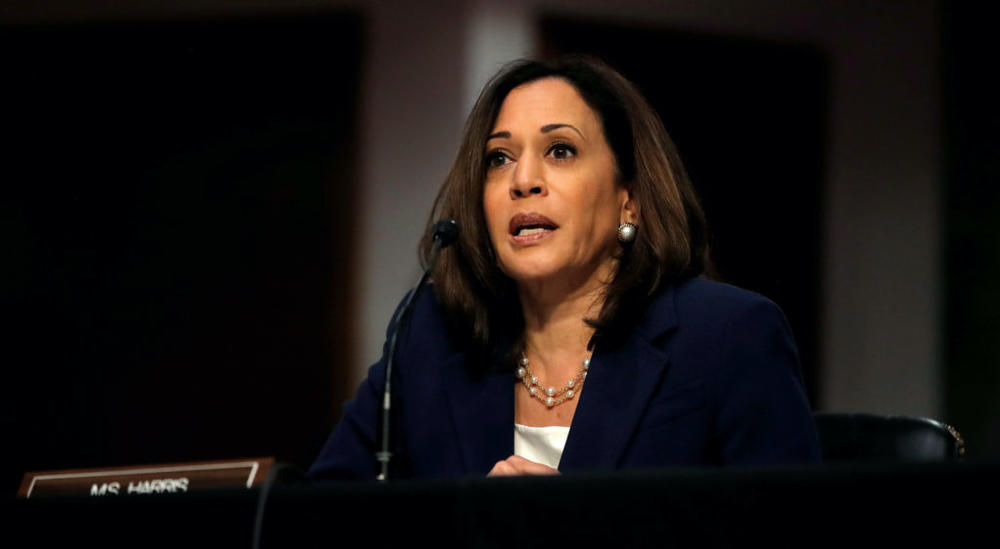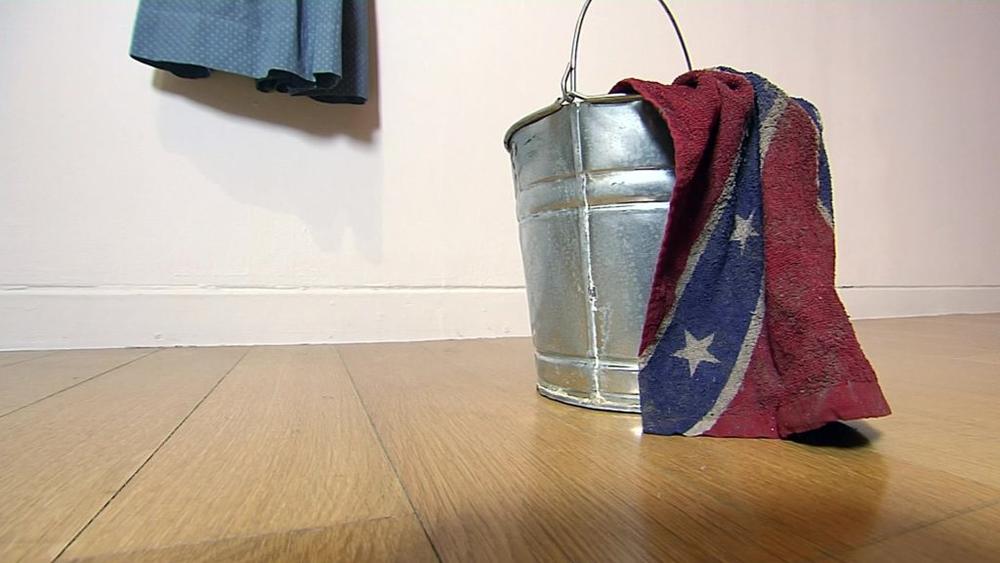
Section Branding
Header Content
Georgia Today: Georgia courts short-staffed; Gun tax holidays; Cash bail bill headed for approval
Primary Content
LISTEN: On the Wednesday, Feb. 7 edition of Georgia Today: Georgia's courts are short-staffed on a variety of fronts; the state Senate passes a bill to allow tax holidays for gun purchases; and Democrats speak out against a cash bail bill now headed to Gov. Kemp's desk.

Peter Biello: Welcome to the Georgia Today podcast from GPB News. Today is Wednesday, Feb. 7. I'm Peter Biello. On today's episode, Georgia's courts are short staffed on a variety of fronts. The state Senate passes a bill to allow tax holidays for gun purchases, and Democrats speak out against a cash bail bill now headed to Gov. Kemp's desk. These stories and more are coming up on this edition of Georgia Today.
Story 1:
Peter Biello: The chief justice of Georgia's Supreme Court says the state continues to face staffing shortages, contributing to a backlog of cases. In his second annual state of the judiciary address today, Chief Justice Michael Boggs told state lawmakers lower-than-average salaries are one reason Georgia is short on court reporters, public defenders and prosecutors.
Michael Boggs: The Prosecuting Attorneys Council of Georgia reports that as of the start of this year, there are a total of 41 assistant DA position vacancies statewide. Eight judicial circuits out of our 50 have assistant DA vacancy rates of 25% or higher.
Peter Biello: He said seven rural counties have no licensed attorneys.
Story 2:
Peter Biello: The Georgia Department of Community Health will not move ahead with a proposed rule change on staffing in the state's certified dementia care facilities. GPB's Ellen Eldridge reports on the impact of the outcry over the proposed changes.
Ellen Eldridge: In 2020, organizations, including the Georgia Council on Aging, advocated on behalf of residents, families and caregivers to successfully pass a bill that strengthened staffing requirements and increased maximum fines for violations. A bill proposed this session would have lowered those minimum staffing requirements. Nancy Pietra is the director of government affairs for the Alzheimer's Association Georgia chapter. She says the same advocacy groups spoke up.
Nancy Pietra: There was such strong public support to not reduce staffing minimums that the department they made the right decision.
Ellen Eldridge: Those who wanted the staffing minimums lowered argued workforce shortages make positions too difficult to fill. For GPB News, I'm Ellen Eldridge.

Story 3:
Peter Biello: Vice President Kamala Harris was in Savannah yesterday to rally abortion rights supporters. GPB's Benjamin Payne reports.
Benjamin Payne: Speaking before an invite-only audience, Harris described the current landscape of abortion rights as a, quote, "horrific reality." She took aim at Georgia law, which bans most abortions after about six weeks of pregnancy, before many women know they are pregnant.
Kamala Harris: One does not have to abandon their faith or deeply held beliefs to agree the government should not be telling her what to do in her body.
Benjamin Payne: Abortion rights are expected to be a go-to issue for Biden and Harris in the 2024 election. A University of Georgia poll found more than 60% of adults oppose the state's abortion law. However, a separate UGA poll last month found Trump has an eight-point lead over Biden in Georgia. For GPB News, I'm Benjamin Payne at the Savannah Civic Center.
Story 4:
Peter Biello: Georgia's entire 16 member congressional delegation has signed a letter supporting a study for another round of deepening of the shipping channel at the Port of Savannah. A copy of the letter sent to top-ranking lawmakers in the House and Senate was released yesterday. The push to study deepening again comes two years after the U.S. Army Corps of Engineers finished a nearly $1 billion dredging project allowing larger ships to reach the port without waiting on high tides. The letter says ships have continued to grow.

Story 5:
Peter Biello: The state Senate has passed a bill to allow guns, ammunition and gun safes to be sold without sales tax for a few days each year. As GPB's Sarah Kallis reports, the measure passed yesterday along party lines.
Sarah Kallis: Senate Bill 344 creates a five-day tax holiday for guns, ammunition, gun safes and other accessories. It would take place in October of each year. The bill's sponsor, Sen. Jason Anavitarte, said it promotes gun sportsmanship and conservation.
Jason Anavitarte: I think it's just allowing those that are doing it in rural communities, and even around metro Atlanta, to have a sales tax break on those items that they're going and buying at the beginning of hunting season.
Sarah Kallis: Democrats who oppose the bill pointed out that Republican leadership has been hesitant to consider tax breaks on items like menstrual products, diapers and baby formula. For GPB News, I'm Sarah Kallis at the state Capitol.
Story 6:
Peter Biello: Georgia senators have passed a bill to remove barcodes from ballots. The measure would mandate that printed text on ballots must be used to count votes, rather than a QR code. The bill would take effect July 1, despite Secretary of State Brad Raffensperger's position that it's already too late to make changes before November's presidential election. The bill passed the state Senate in a 31 to 22 vote, and now goes to the state House for more debate.
Story 7:
Peter Biello: The U.S. Supreme Court tomorrow will hear arguments in a case to decide whether a constitutional amendment aimed at keeping Confederate veterans from elected office means anything to the candidacy of former President Donald Trump. More than 150 years ago, the power of the 14th Amendment greatly concerned a figure in Georgia history who achieved two firsts in his lifetime but is mostly forgotten. GPB's Grant Blankenship introduces us to Jefferson Franklin Long.
Grant Blankenship: When you walk into the main gallery on the first floor of the Tubman African American Museum in Macon, the first thing you see is a very old chair.
Ivy Dockery: And no, you cannot sit in this chair. And don't let me see you rocking back and forth like I see grown folks and kids doing here.
Grant Blankenship: Because, says the Tubman Museum's Ivy Dockery, the chair is important to this exhibit and history.
Ivy Dockery: This is untold stories making African American history. Everybody here are old Maconites.
Grant Blankenship: And, says Dockery, the story of Jefferson Long, the man the chair belonged to, is the centerpiece.
Ivy Dockery: Look at the year: From 1836 to 1901.
Grant Blankenship: Jefferson Long was born into slavery in 1836, in nearby Crawford County. Later living in Macon's Pleasant Hill neighborhood, he taught himself to read and write.
Ivy Dockery: From the newspapers that he used to get from the Macon Telegraph office that was right next door to where he used to work.
Grant Blankenship: As a tailor. But that's not why Long is remembered.
Ivy Dockery: And for him to become Georgia's first African-American congressman is something else. It's really amazing.
Grant Blankenship: Even, says Alan Lichtman, if most people don't remember that.
Alan Lichtman: Most people don't know who he was.

Grant Blankenship: Lichtman is a longtime presidential historian and professor at American University in Washington, D.C. He's one of 25 distinguished historians from places ranging from Princeton to the University of Georgia, who wrote and submitted an amicus brief, a kind of research paper about the 14th Amendment to the Constitution, arguing it applies to former President Trump. The brief is now on the docket of the Supreme Court case Trump v Anderson.
Alan Lichtman: The 14th Amendment was the first so-called Reconstruction Amendment adopted after the 13th Amendment ended slavery.
Grant Blankenship: It came after Reconstruction. The plan meant, in part, to extend basic civil rights to African Americans in the South was running off the rails. And Lichtman says the amendment was motivated.
Alan Lichtman: By attempts right after the end of the Civil War of ex-Confederates to take over the new Southern government.
Grant Blankenship: Section 3 of the amendment should have kept them from office. So by the time we get to like the 1870s, on paper, these issues shouldn't even be debatable, right?
Alan Lichtman: They should not have been debatable.
Grant Blankenship: And yet they were debated by a U.S. Congress, which for the first time ever was composed and part of African American representatives, including Jefferson Long of Macon, the first Black person to represent Georgia in the U.S. House. Meanwhile, Confederate veterans had already joined domestic terror groups like the Ku Klux Klan, and it killed hundreds by the time Long set foot in the U.S. Capitol. But in 1871, Long and the rest of Congress debated an amnesty bill which would have acted against this section of the 14th Amendment Lichtman says today applies to Trump. This is where Long made history again, as the first Black person to speak on the floor of the U.S. House. Alan Lichtman:
Alan Lichtman: His words were very prophetic and accurate. He pointed out that, "why would you want to relieve from disability" — I quote — "the very men who have committed these Ku Klux outrages?"
Grant Blankenship: Long asked, why would we let these people anywhere near elected office when, quote," those disloyal people still hate this government when loyal men dare not carry the stars and stripes through our streets?" Long went on, quote "I think that I'm doing my duty to my constituents and my duty to my country when I vote against any such proposition." The amnesty bill passed.
Alan Lichtman: And what happened? The ex-Confederates went back into government, including at least 20 who became governors. And what did they do? They participated in establishing the system of Jim Crow discrimination in the South.
Grant Blankenship: A system of oppression so thorough it served as a model for Nazi Germany. In his speech on the House floor, Jefferson Long had some vision of that, too.
Alan Lichtman: He concluded his statement by saying, "I venture to prophesy that you will again have trouble from the very same men who gave you trouble before," and that was 100% accurate. He was right on the money.
Grant Blankenship: Jefferson Long left office, but would lead Black voters to the polls in Macon in 1872. Some of those voters were shot and killed. Georgia would not send another African American to the U.S. House for 100 years. For GPB News, I'm Grant Blankenship in Macon.

Story 8:
Peter Biello: A bill to require cash bail for 30 additional crimes is headed to Georgia Gov. Brian Kemp's desk. The GOP majority in the House and Senate moved it through the Legislature, arguing it would make communities safer. The bill rolls back changes that Republican Gov. Nathan Deal championed in 2018, allowing judges to release most people accused of misdemeanors without bail. Democrats opposed Senate Bill 63 and among them was Sen. Josh McLaurin of North Fulton. I spoke with him at the Capitol earlier today.
Peter Biello: Proponents of this bill say it's going to make communities safer. You and other Democrats disagree. Why?
Josh McLaurin: Well, let's start with the background facts. The FBI releases crime data quarterly and yearly, and the data for 2023, finishing last year show that crime is still in a freefall around the country. Different types of crime falling, close to up, you know, up to 10% almost. The FBI says that this is the lowest property crime level we've had since 1961. So, you know, let's not be mistaken about the reason for this bill. It's not because we're trying to respond to crime rates. Those are going down. What's happening is it's an election year, and this is the public safety messaging the Republicans have poll tested and think will be most effective, for maintaining their majorities in the state legislature of Georgia.
Peter Biello: This bill adds crimes to the list that would now require cash bail. What do you make of the crimes newly added to the list? Do you think they require this?
Josh McLaurin: No. And, you know, a lot of the majority's mindset here is they're looking at the seriousness of the offense charged — again, not convicted, just charged. And they're saying "we don't like that offense," or "we think that people who are charged with that offense should be held accountable. So we want to make sure that they either stay in jail or have to pay some kind of security in the form of, you know, a bond before they come to trial." Well, that's punitive, the way that they intend it. And it's just not the the time for that. You have to wait until somebody is convicted before you can apply punishment. So the questions we — the only questions that we really should be asking are what policies do we need to make sure people come to court and make sure that people don't harm anybody while they're awaiting trial? And the truth is, judges are uniquely in a position to decide that for themselves. And so judges are really making these tough public safety decisions on our behalf. The last thing we need to be doing is taking authority away from those judges, or forcing those judges to make more and more punitive decisions just because it's good for the legislative politics of the majority.
Peter Biello: My understanding is that this bill still would allow judges to take into account defendants' ability to pay. And they could set very low bail if they wanted to. Does that not mitigate some of the negative effects you're describing?
Josh McLaurin: So this is one of the arguments that's been made for several years around the Capitol. You know, "Yeah we're requiring cash bail. But look, a judge could only give a $1 bond if they wanted to." But let's be very clear about what's happening. This is a bill that's designed not just to take discretion away from judges, but to make their politics more difficult. We have elected judges in Georgia, and those judges have to run for reelection every four years or so, depending on the situation. And so those judges are thinking about how the community is going to respond to their bond decisions. You know, let's say that the worst thing happens and they — they make the decision that somebody is safe to let out into the community while they're awaiting trial and then that person hurts somebody else, right? That judge is worried that that's going to mean political blowback for that judge. And that's the entire point of the bill.
Peter Biello: What about the impact on jails? They're already overcrowded. Is this going to make that worse?
Josh McLaurin: It will. And, you know, one of the frustrating things about this debate is that, you know, some of the — well, first of all, let's let's wind the clock back. Unfortunately, I can talk about this for way too long, so feel free to cut me off. But Nathan Deal, you know, as a Republican governor who I can appreciate as a Democrat for all of the work that he did over years and years to build the political will to reform the criminal justice system in Georgia. And one of his signature initiatives was to try to limit the use of cash bail, not to expand it. Under the Kemp administration, we have seen a 180-degree turn away from that trajectory. You know the question will this make overcrowding worse? Fulton County had a real issue with overcrowding — has had for a very long time. And some of the the, decisions on bond that the majority is complaining about came out of Fulton County. So what they would do is they'd take these cases from Fulton County where judges made these impossible decisions. You're facing an overcrowded jail with a large risk of violence, and you're not sure whether the person that you're making a decision about would be safer inside or outside, or whether the community would be safer, whether this person was inside or outside, you know, because the jail is at its breaking point. So those judges made really difficult decisions and in some cases let people out on bond when they had very serious charges. And that made the majority really mad, right? So it is a really perverse and backwards policy response to say, well, "we're we're upset these judges are trying to manage overcrowding the best that they can. Let's pass bills that will make it even harder for them to manage overcrowding by forcing them to throw even more people inside for even less serious offenses." It's just the — it's like if you saw a fire and the only liquid you had around was gasoline, and you said, "well, we don't have any water, so we might as well for this gasoline on the fire because we've got to do something, right?" I mean, it's — they're just making the problem worse, but pretending that it does the opposite.
Peter Biello: This bill also makes changes to what bail funds can do, really limits their activity. What do you think the impact will be on bail funds like the Atlanta Solidarity Fund?
Josh McLaurin: Well, they're effectively trying to ban them, because one of the — So the bill requires any bail fund that provides charitable bails to third parties to register as if they were a bondsman, a bail bondsman company. Well, in the code, it provides that a bail bondsman company can only operate within a county or a jurisdiction if the local sheriff allows you to. The sheriff basically has discretion whether to let you operate or not. And I doubt very seriously in the political climate we're in, especially with, with the forces motivating this bill, that a lot of sheriffs are going to look favorably on this type of a bail fund.
Peter Biello: So does that mean under this law, individuals could now possibly step up and take the place of what these bail funds used to do? Or is that also limited?
Josh McLaurin: Oh, right. Funny you should mention that, because the first part of the new bail fund language in the bill says that no individual, corporation, nonprofit, anything can post more than three cash balls at all in a year. And it doesn't say per defendant. It just says the individual cannot do more than three. So one of the things we were talking about in the chamber is if you've got four kids and you know, they all get arrested for trespass or at a protest or something, well, you can only post bail for three of your kids, right? Because you're limited at that yearly quota of three. So again, this is — let's let's go back to the sort of basic public policy question here, which is why do we need bond or bail in the first place. That's to reduce harm and make sure people show up to court. So this limit of three per year bears no reasonable relationship whatsoever to that policy goal. It's just an attempt to limit people's access to freedom pending the trial of their case.
Peter Biello: What is the next step for those who are concerned that people who simply can't post bail — if they don't have enough money to post bail — will end up being in jail for a lot longer than they otherwise would be.
Josh McLaurin: Progressives have been hoping that this administration would not go down this trajectory even further, but it seems like something they can't stop themselves from doing. Each year under this administration in Georgia, we're seeing a move incrementally towards worse and worse cash bail policy. And because it bears no relationship to actual public policy, there's never really a natural stopping point. I don't know that there's going to be political will until we get Democratic leadership to roll back some of these regressive policies.
Peter Biello: Well, Sen. Josh McLaurin, thank you so much for speaking with me about this. I appreciate it.
Josh McLaurin: Thank you, Peter, I really appreciate it.

Story 9:
Peter Biello: Coca-Cola is hoping to cash in on the trend of American snacks getting spicier. The Atlanta-based beverage giant today unveiled a new raspberry-flavored soda called Coca Cola Spiced. It's the company's first new permanent offering in its North American portfolio in three years. Coca Cola Spiced doesn't have a lot of heat. It's more like an amped-up version of spices in regular Coke. The product is aimed at younger consumers and is set to go on sale in the U.S. on Feb. 19.

Story 10:
Peter Biello: And finally, R&B icon Usher is having a busy year. He's releasing his first solo album in eight years on Friday and headlining the Super Bowl halftime show on Sunday. And he's just announced he'll hit the road for a new North American tour. He'll stop in 24 cities for his "Past, Present, Future" tour beginning Aug. 20. And of course, he'll make two stops in Atlanta in October.
Peter Biello: And that is it for this edition of Georgia Today. If you want to learn more about any of these stories, visit GPB.org/news. And if you haven't subscribed to this podcast, take a moment and do it now. We'll be back automatically in your podcast feed tomorrow. If you've got feedback or a story idea, send it to us by email. The address is GeorgiaToday@GPB.org. I'm Peter Biello. Thanks again for listening. We'll see you tomorrow.
---
For more on these stories and more, go to GPB.org/news



